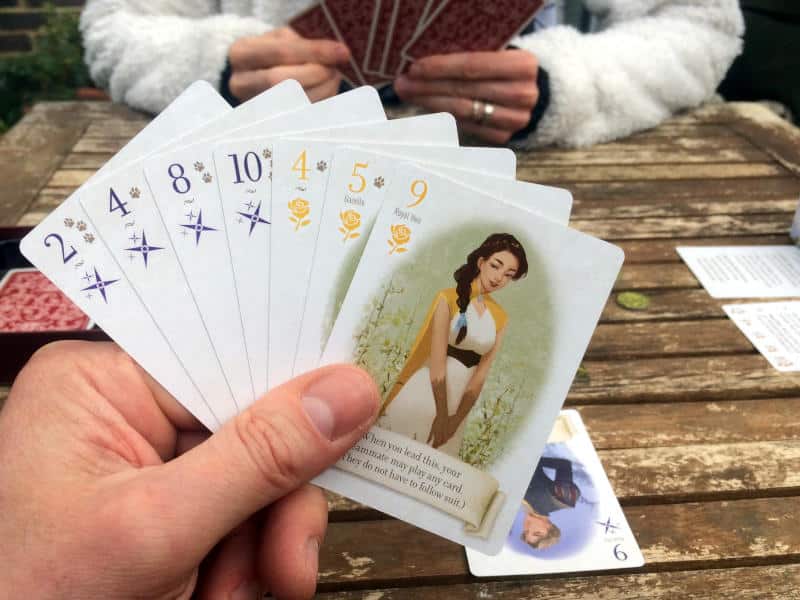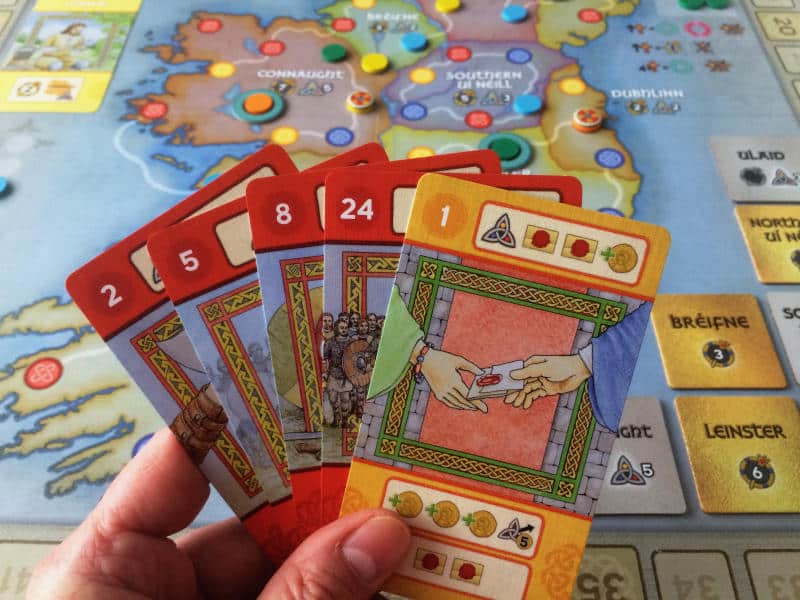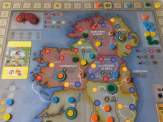Growing up in Germany, I started playing traditional trick-taking games like Skat or Doppelkopf from a relatively young age. I’m used to the idea of suits, trump, following suit, taking tricks, gleaning information from what cards others play and much more. Traditional trick-taking games sort of have their own language. So I love to see modern games developing this mechanism further and incorporating it into other mechanisms, creating completely new game experiences.
Cooperative
The first thing I want to mention is cooperative trick-taking games. Traditionally, trick-taking games are semi-cooperative. They’re basically team games, where it’s one against two, two against two or maybe one against one. So that trick-taking games can be fully cooperative is an exciting idea for me and meant I was able to introduce my wife to this genre of games that’s so close to my heart.
The first cooperative trick-taking game I came across is The Crew. It’s a game that works really well with only two players, but of course, goes up to five players. That meant that I could also use it to teach my games group about trick-taking. As it’s a cooperative game, you are learning together. Officially, you’re not allowed to talk, but for anyone who doesn’t know anything about trick-taking, it makes sense to play your first few games completely openly and talk everyone through why you might want to play in a certain way. Treat them as proper learning games and hopefully, the concepts of trump, following suit and everything else starts to make sense to everyone.
Fox in the Forest: Duet is another great cooperative trick-taking game. It’s for exactly two players and adds special card powers, thereby making decisions about what cards to play when much more interesting. It also means that sometimes a bad decision can be cancelled out by a useful card.

Competitive
Then there is the myriad of competitive trick-taking games of course. Many of these have a fixed player count, following the traditional approach. As I mentioned before, Skat and Doppelkopf are card games I grew up with and they require exactly three and four players respectively. Vivaldi is a game that I only learned about in the last few years. It has a fixed player count of five and is based on a traditional Italian trick-taking game.
What all of these games have in common is that, you play them over several rounds, usually agreed at the beginning, but often you just decide when to finish as the day or evening goes on. Whoever has the most points at the end is the overall winner. However, even though they’re ultimately competitive games, each round is played in teams. In Skat it’s one against two, Doppelkopf two against two and Vivaldi two against three. While in Skat it’s clear from the start who plays alone against the other two, in Doppelkopf and Vivaldi, nobody knows immediately who they’re playing with. It only becomes clear during the game.

Get yourself a wooden Tabletop Games Blog dice tray.
Each tray is the perfect size to roll your dice, and with the soft mat, it’s really quiet, while the wooden frame makes it wonderfully sturdy.
I think there are two really clever ideas here that I would like to see in modern board games: even though there is one winner at the end, you do work together for some of the time and for some of the game you’re not sure who you’re working together with, which means you have to play for yourself, but be ready to help your partner as soon as they’re revealed. The idea that you’re temporarily working as a team creates a really positive atmosphere that other games should try and incorporate.
Trick-Taking Among Other Mechanisms
Some games add other mechanisms to trick-taking. Skull King, for example, adds a bidding phase. Everyone plays for themselves here and it doesn’t really matter if you have been dealt a really good or a really terrible hand. The most important thing is that you correctly predict how many tricks you’ll be taking this round. If you get it right, you get points, even if you only won a single trick or none at all. That’s a really clever twist, in my view.
Other games add a lot of other mechanisms and trick-taking is just an engine that drives a much wider game experience. Just look at Brian Boru, where trick-taking is used to decide which action players can carry out and in what order based on the card they played and whether they won the trick or not. It’s basically action selection via trick-taking. Sometimes you intentionally lose a trick, just so you can carry out the action you wanted.
What’s funny is that on Board Game Geek, Brian Boru isn’t listed as having a trick-taking mechanism. Instead, it says it’s about hand management, which I don’t think properly describes it.

Non-Trick-Taking Games
There are also games that feel like trick-taking games, but in fact, they are not. Scout is an example. People think they’re taking tricks, when they play a better set of cards than the current set, but it’s not a trick. Scout is actually a so-called “ladder climbing” game, because all you’re really doing is trying to outbid the previous player with a better selection of cards.
On the other hand, Top Trumps is actually a trick-taking game, be it a relatively simple one. You could say that by selecting a statistic from the card, you’re deciding what the trump suit is and all that then matters is if other players can beat your trump card. If you look at it that way, you’ll find that a lot of people actually have played a trick-taking game before.
How About You?
So now I want to know what your experiences are with trick-taking games. Have you played any games that use trick-taking as a mechanism? How did you find it? What is your favourite trick-taking game? If you’ve not played any trick-taking games yet, why not? Are you put off by all those “technical terms” like suit and trump? As always, please share your thoughts and experiences in the comments below. I’d love to hear from you.
Keeping the blog running takes time and resources. So if you can chip in, that would be amazing.
Useful Links
- Skat: https://boardgamegeek.
com/ boardgame/ 6819/ skat - Doppelkopf: https://boardgamegeek.
com/ boardgame/ 9364/ doppelkopf - The Crew review: https://tabletopgamesblog.
com/ 2020/ 12/ 05/ the-crew-the-quest-for-planet-nine-saturday-review/ - Fox in the Forest: Duet review: https://tabletopgamesblog.
com/ 2022/ 04/ 30/ the-fox-in-the-forest-duet-saturday-review/ - Vivaldi review: https://tabletopgamesblog.
com/ 2019/ 11/ 23/ vivaldi-saturday-review/ - Skull King review: https://tabletopgamesblog.
com/ 2020/ 01/ 04/ skull-king-saturday-review/ - Brian Boru review: https://tabletopgamesblog.
com/ 2022/ 04/ 16/ brian-boru-high-king-of-ireland-saturday-review/ - Scout review: https://tabletopgamesblog.
com/ 2022/ 07/ 02/ scout-saturday-review/
Audio Version
Intro Music: Bomber (Sting) by Riot (https://www.
The following music was used for this media project:
Music: Lofi by DreamHeaven
Free download: https://filmmusic.io/song/6148-lofi
License (CC BY 4.0): https://filmmusic.io/standard-license
Artist website: https://www.patreon.com/dreamheaven





